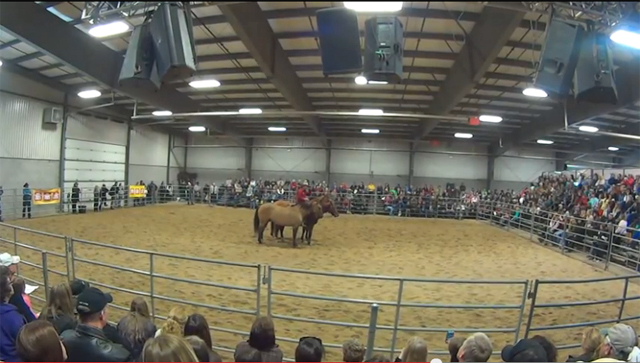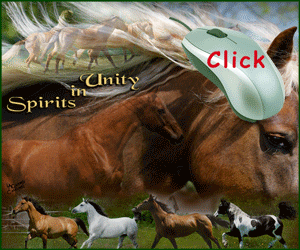
CFN – This Column of “Spirits in Unity” is being published by CFN for the community of Stormont, Dundas & Glengarry.
Today’s column is a compilation of thoughts inspired by various writings, talks and presentations of Horse Masters Pat and Linda Parelli as well as personal experiences with horses.
When In Rome, do as the Romans Do
Who won the battle for dominance between Poncho and Atlas. Well I guess we will have to call that one a draw.
When in Horseville do as they want to be done by
You’ve probably heard the golden rule that goes, “Do unto others as you would have them do unto you”. Well it is sort of the same in horseville except it is more like “Do as they would want to be done by.” It is false thinking to believe that others have the same desires, fears and motivations as you do, let alone horses. Given that they are prey animals, what is important to them is completely the opposite of what is important to us.
We have outlined before in these columns the hierarchy of needs for horses and humans. Let us review that now as it is key to developing good rapport with horses.
Horses want:
1. Safety
2. Comfort
3. Play
4. Food (food can only be considered a ‘reward’ when the first three needs are met)
Humans Want:
1. Praise
2. Recognition
3. Material things. (including possessions, gifts, treats, etc.)
Humans tend to project what we want onto our horses by using praise, treats, saying their name, giving them lovely blankets, etc. But none of this matters to horses.
The best way to get rapport with other people is to do what they do. The most charismatic politicians are very adept at this. The scientific study of NLP (Neuro Linguistic Programming) studies this phenomenon and one of the techniques they teach is ‘match and mirror’, and surprise , surprise it is the same technique we use with horses. Essentially, it states that if you match and mirror another person’s stance, gestures, language, tone, pace, breathing, etc., they will feel more comfortable around you and therefore more attracted to you. We see examples of this every day in our human lives. Teenagers, for instance, will tend to dress like the friends they hang out with in order to ‘fit in’.
Recently I had the opportunity of attending the CanAm Equine Emporium in Orangeville and see horseman and bush poet Guy MacLean and Jonathan Field in action. These two horsemen, like so many horse masters, have that unique ability of mirroring the horse’s actions in a way that seems seamless and a times almost invisible. When you meet these gentlemen in person, you will understand why they can do this because they have a way of putting you at ease.
Like a horse out of ‘herd‘?
Have you ever had the experience of being in among a group of people who are the completely the opposite of you and have experienced the discomfort of feeling like a fish out of water? You tend to focus on how uncomfortable you are and you might even feel threatened. Think about this carefully. You have these feelings and you are the same species. How might a different species feel in among humans? Like a horse out of ‘herd‘?
Have you ever noticed how horse shows are divided up with western riders one day and English riders the next. Then there are those of us who use natural horsemanship techniques with our strange talk about bonding, our peculiar training aids, etc.
Imagine the poor horse, a prey animal in the midst of predators (humans). We are so different: They are prey, we are predator. They are quadruped, we are biped. They use body language, we use verbal language. And of course our needs are completely different.
Horses are not in the least interested in learning how to act like a predator. They are more interested in outwitting predators. It’s in their programming. So it falls to us to make the transition and try to act more like we belong in their world.
So in establishing rapport with horses, we need an approach that is more like that of a prey animal.
We need to:
– hesitate
-retreat and reapproach
– approach in wide arcs rather that straight lines.
Then the next move is the horse’s move: to reach forwards (if you have done it right) or to leave (if you’ve scared him). Often for us we tend to push horses away from us because we think that it is dangerous, but in actual fact to want them to come to you. Gently of course but come to you nonetheless. A young child who is feeling uncomfortable seeks the closeness of his parent. So we have to nurture that feeling in our horses so that he perceives us the way he perceived his mother when he was a foal.
You have to do whatever it takes to help the horse feel safe and comfortable around you and if the horse needs to move away do not trap him, but allow him to drift a little. Learn to let that lead line slide through your hand instead of gripping it in a death grip.
Once you get the horse feeling safe and comfortable, you will now be in a place where he will want to play with you. You need to learn how to play physical dominance games with your horse, but if you dominate him before he feels safe around you, you will lose rapport and respect instead of gaining it.
This is a very fine line to walk and is not as easy as it may seem. One of the things that can be of great help is in understanding the different personalities there are in horses and how to treat each personality. We will discuss this idea in more depth in a future column.
In review then, remember that what it takes for other people to accept us is also what it takes for horses to accept us. When in Rome, do as the Romans do.
When you think about energy as the first thing to match, it immediately causes you to be more extroverted or more introverted according to how the horse is behaving. Extroverted behaviour involves more movement and more energy where as introverted behaviour involves less movement and lower energy. When your energy is different from your horse’s energy, you will break rapport or have a very hard time building it.
Matching your horse’s energy is not an easy skill to develop. If you watch true horse masters at work you will see how quickly they can change their energy level to match their horse’s energy level.
Here are some things to think about when expressing energy:
1. How quickly is your mind is working.
2. How much mental or emotional energy, tension, excitement is coming out from you even if you are not moving your feet.
3. How do you move yourself – your feet, arms, eyes, head, and body.
Sometimes even when your feet are not moving, it is hard to calm our thoughts. And horses react to this mental energy somehow. When a horse is extroverted he can feel a sort of disharmony and will lose rapport with you if you don’t match his energy level. So sometimes being too slow can be just as big a problem.
I see this all the time in my students. They become so tentative in their actions that they fail to do anything because they are afraid of losing rapport with their horse. Sometimes you just have to go for it. Fortunately for us, horses have a very forgiving nature, and through practise you will get it eventually.
Learning to feel your horse’s mental and emotional energy is more important than the physical because it’s the mind and emotions that move the feet. To gain horsemanship mastery means: first; understand the horse’s behaviour how to read body language, second; develop a high level of awareness.
People have a very difficult time controlling their physical behaviour let alone their mental and emotional feelings. Horses on the other hand are extremely perceptive animals. They can read you like a book. I guess your story has to be one they really want to read.
Your Energy Quotient
Here is a quick Energy Quiz for you. Look at each example and decide if your answer would be ‘yes’ ‘no’ or ‘sometimes’.
Physical Energy – Are you:
-quicker
-slower
-the same
Mental Energy – Are you:
-ahead of your horse’s thought
-behind his thoughts and therefore surprised by your horse’s actions.
-just right
Emotional Energy – Are you:
-calm and able to control your ‘butterflies’
-nervous
-intense
-insensitive
-hyper-sensitive
-emotional (easily upset, frustrated, disappointed, angry, etc.)
I leave you today with a video of Guy McLean reciting the poem he wrote when he won the Road to The Horse competition for the second time this year. It is called “This is War” and it expresses many of the feelings I try to get across in these columns. Let’s stop making war on these animals.
Next time, a topic that I find absolutely fascinating, “Understanding your horse’s Personality.” Until then “May the horse be with you”.
For all those people who give horses loving homes, and for all those kids who are wishing for that special partner, may all your dreams and your horse’s dreams come true also.
Whether you are just a horse lover, have dreams of owning a horse someday, or already have one, I hope these columns will give you some insight into the true nature of these magnificent creatures. I hope you will find them both informative and inspirational.
Please click on ‘like’ if you enjoyed this column and make a comment as well. We look forward to your feedback and questions.
Be part of your horse’s dreams, not his nightmares.
Garry “Horsetalker” Meek


Great article Gary!
Thanks for,sharing Guy McLean’s poem!
WHAT A HORSEMAN!
The more of these columns I read the more I wonder if I actually have “horses” out in my pasture.
I have one horse (Stepper) who comes like a dog when you call his name weather he can see you or not 🙂
I have another named Charlotte, who will walk, trot and canter but only if you ask her (verbally) nicely and you are female !
Then there is Jack the donkey ! A wise man once said “You can tell a mule and ask a horse, but you negotiate with a donkey.”
Thanks for the inspiration Garry 🙂